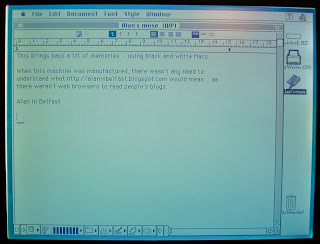About five or more years ago, I remember mobile and PDA magazines running articles questioning whether it was better to have a PDA with a mobile function or a mobile that supported some PDA functions. Nowadays the convergence is nearly complete. Today, there's hardly a PDA on the market that doesn't have a phone built-in.
And it'll not be long before the more recent arguments on whether cameras and MP3 players can be successfully integrated will have moved on too.
But in living rooms and bedrooms across the country, there are an increasing number of boxes piled up on each other with a TV/monitor sitting on top. There's a need to reduce the clutter of boxes sitting under household TVs. DVD players no longer deserve an inch and a half of space.
Why doesn't the Nintendo Wii double up as a DVD player? It can read DVD discs. It can be hacked to add mplayer software to play films. But why isn't it supplied as standard from the factory?
Why does a product like an Apple TV not include a Blu-ray player? Then it could truly become a home media centre - providing access to media imported into or downloaded to iTunes as well as HD quality output and surround sound. And if on-demand content was available and well integrated - perhaps through something like iPlayer - and USB dongles providing access to Freeview (DTT) and Freesat (DSat) could complete the options.
(In case I haven't mentioned it before, I'm very impressed with EyeTV's USB DTT hardware, as well as the useful and usable bundled software. Just wish it would occasionally use an idle moment to scan through little watched channels/multiplexes to grab the schedules and keep its schedule database as up-to-date as possible - as the live schedules are so much more complete that the tvtv website ones.)
Dear {electronics industry}, Please converge some more in 2009. Thanks, Alan
Yet my argument for convergence breaks down a little if we look at the 2008 phenomenon of netbooks. Screen resolution, keyboard size and DVD drives all ditched for weight and dimensions. Portability, battery life and wifi/3G accessibility more important. Though they do throw in a camera, mic and expandability via USB.

A few days before Christmas, a friend dropped in with a card and a laptop case. Inside was a prehistoric Mac laptop - a PowerBook 150. Sold between July 1994 and October 1995.

Pre-dates USB. Pre-dates CD drives. Pre-dates Apple abandoning AppleTalk networking and adopting standard Ethernet ports and protocols. Comes with a trackerball, black and white 640x400 display and a floppy drive!
3 comments:
I think there is another factor which is blocking convergence. That is DRM. It gets in the way of interworking, forces higher hardware costs, reduces flexibility and can turn the users into criminals. At least the iPlayer allows common platforms to stream content but the ITV player is far too restrictive; no Macs or Linux allowed.
XKCD put it rather well in http://xkcd.com/488/
p.s. Psion had a nice range of machines too
Funny enough, been there, done that. I had a Psion Netbook too ... and a PCMCIA modem to slot into it - it never did support the ethernet card.
Battery died really quickly though - but an excellent machine, great word procesor, and used the email client for btinternet email for a year or two.
And easy enough to programme OPL on - and use stuff from the Psion 5 and Revo (and Geofox).
To be fair, they didn't adopt the "standard" ethernet ports because they were not standard on any machines other than business desktops. No laptops of any make shipped with ethernet as standard. The fact they shipped Appletalk shows that they knew laptops were to be networked and I do have a Localtalk to Ethertalk adapter lying round the house somewhere.
Convergence has happened, just not in the way we expected - the Phone seems to be the convergence point - not the computer.
Post a Comment